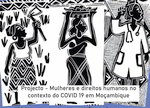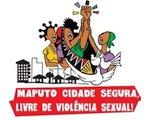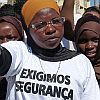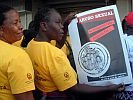The legal situation of women in Mozambique and the reforms currently under way1
by Conceição Osório and Maria José Arthur
Published in: Outras Vozes, Suplemento do boletim n° 3, July 2003
Citizenship for women today means much more than the right to vote. It implies equal opportunities for men and women; it means the right to education, to health care and to a job. It means the right to control their own body and their sexuality, as well as access to land. The actions of the feminist movements and of the international agencies of the United Nations have helped to bring these demands on to the international agenda. The result was that state commitment to the elimination of gender discrimination became more explicit, through the preparation and later ratification of conventions and the adoption of mechanisms to implement them. A stage was reached where the subordination of women is no longer socially acceptable, which lent more impetus to the legal reforms designed to guarantee equal rights.
The purpose of this article is not only to discuss the legal reforms currently under way in the country, but also to point out their limitations in the struggle for women’s rights.
Legal reform and gender equality
Although the link between the law and the social status of women and their opportunities for access to resources is recognized today, it must be constantly stressed that that legal reform alone is not enough to guarantee gender equality. For this reason the law by itself is not sufficient to reduce gender imbalances, because of the assumptions regarding the legal system that mask the fact that men and women are placed differentially before the law. This imbalance lies in the abstraction of the figure of the individual “before the law”, stripped of its social characteristics, that constitute the legal basis of citizenship. Equality before the law is not a principle of social equality, but rather one of neutrality and of impartiality between parties, which appear before it as equals. This then becomes a case of neglecting the social causes of inequality, be they wealth, class or sex, and treating individuals without the social characteristics of inequality (Cohn & White, 1997).
It is thus important to avoid treating the law as a thing in itself, divorced from the context in which it exists. One must always begin not with the statutes, legislation and policies, but with the context in which the law functions, and taking account of the real interests and needs of women.
Other aspects must be considered in this regard. In addition to what the law says – its content – we have its application, the structure of the legal system, the courts and the administrative agencies of the state. The manner in which that all functions is in practice just as important as the content itself.
Another vital question that is often underestimated is that of the “legal culture”. This does not refer to the general cultural habits, but to the way in which people regard the law in particular. Do they respect it or not? Do they use it or not? The attitudes and the behaviour of all members of society, from the ordinary citizen to the judges of the supreme court, have as much bearing on the content of the law and the manner in which the system functions (WLDI, 2000).
Mozambique: discriminatory aspects of the law and the legal reforms
Since 1975 the Constitution of Mozambique guarantees no discrimination between women and men. The 1990 Constitution is even more explicit in this regard, in articles 6 and 67:
- Article 6 – All citizens are equal before the law, enjoy the same rights and are subject to the same duties, regardless of colour, race, sex, ethnic origin, place of birth, religion, level of education, social position, marital status of the parents or profession.
- Article 67 – Men and women are equal before the law in all spheres of political, economic, social and cultural life.
Within this spirit, only legislation that did not conflict with these provisions was retained (Casimiro et al., 1990: 83) while at the same time, laws that expressly went counter to this principle were amended.
When the people’s tribunals were created in Mozambique after independence, the purpose was to bring the justice delivery system closer to the people. In addition to the formalization of these places for the mediation and arbitration of conflicts through elected structures rooted in the community, other places for conflict resolution were informally accepted, such as the Organisation of Mozambican Women and the neighborhood dynamising groups.
While the access of women and men to justice was made easier, the traditional forms of mediation lost their legitimacy in the revolutionary context. This loss of legitimacy was extended to the traditional norms that governed social relations in Mozambican peasant society.
Although there were restrictions in the application of the norm, it may be said that in the period from 1975 to the end of the 80s, women had the opportunity (and used it abundantly) to seek solutions to their problems (mainly marital and labour related) at places rooted in their communities of origin. This situation, mainly in that period, helped to increase women’s access to justice visibly.
However, the changes in the political and social orientation at the beginning of the 90s, notably the abolition of the people’s tribunals, led to a situation in which access to justice is through the formal system, which had become the only legitimate place for the resolution of conflicts.
At the same time, the body of law has not in essence been changed since independence, and many spheres in Mozambique are governed by laws that were written more than half a century ago.
In the meantime, in 1993, Mozambique adopted and ratified the United Nations Convention on the Elimination of all Forms of Discrimination against Women (CEDAW), by means of resolution 4193 of the Assembly of the Republic of 2 June and which came into force on 16 May 1997. In fact CEDAW has been ratified by 47 of the 53 countries in Africa, which is regarded as important for creating the conditions to give women access to decision-making levels of power throughout society (Binka, 2000).
Women’s organisations used these grounds to pressurize the government strongly to undertake more thorough legal reform in order to reflect not only the spirit of the Constitution and the conventions signed, but also social reality itself, since there have been profound economic and social changes in the country in recent years. After the Beijing Conference, the plan of the Ministry of Justice2 included:
- Revision of the Civil Code, in the part relating to the family, in particular that dealing with “de facto unions”, divorce, adoption and paternal power;
- Revision of the Penal Code, relating particularly to abortion, prostitution, pornography, violence and rape;
- Revision of the part of the Civil Code and the Commercial Code relating to succession;
- Ratification of UN conventions that protect women: suppression of the traffic in human beings and of the exploitation of prostitution of others;
- Promotion of greater participation of women in the police.
The Legal Reform Commission was created in 1997 to take charge of the process of legal reform. It is composed of two sub-commissions, one for the revision of the Family Law, and the other for the revision of the Penal Code.
The draft Family Law has now been submitted to parliament, after a process that lasted about three years and involved various sectors in society, namely women’s organisations.
Other challenges now await us, such as involvement in the revision of the Penal Code, a process that is being led by the Ministry of Justice. At the same time, the Women’s Forum is chairing a committee involving different organisations whose purpose is to draft a law against acts of domestic violence, to be submitted to parliament.
Winning the battle on the legal reform front would be a major victory, but much remains to be done. We must continue to put pressure to ensure that the justice delivery system and the institutions of the State function more equitably, with regard to gender, while continuing with education and awareness programmes aimed at developing a culture of democracy that does not exclude women from enjoying the citizenship.
- Summary of an article written for WLSA Mozambique, “Reassessing the legal situation of women in Mozambique”, 2001.
- Ministério da Justiça (1996).- Plano de Acção.- Maputo.- (dact.)
References:
BINKA, Charity (2000). – “A report on the Addis Ababa Conference”. – In: Lolapress International Feminist Magazine. – (lolapress@ipn-b.de)
CASIMIRO, I., CHICALIA, I., PESSOA, A. (1990).- “The legal situation of women in Mozambique”. – In: J. Stewart & A. Armstrong, The legal situation of women in Southern Africa, Harare: University of Zimbabwe Publications. – pp. 75-96
COHN, E.S. & WHITE, S. O. (1997).- “Efectos de la socialización de los valores legales sobre la democratización”.- In: Revista Internacional De Ciencias Sociales, 152.- (clique aqui para descarregar o documento)
WLDI (2000).- “Making Human Rights Work for Women”.- In: Women, Law & Development International Bulletin.
* * *







 Information in English
Information in English



















